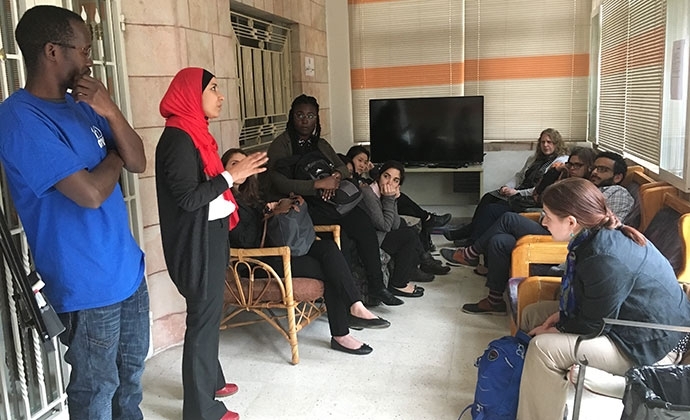‘Doubling Down’ on International Law
As members of the United Nations convened recently for the annual meeting of the General Assembly, students at Columbia Law School assembled for Global@CLS, an overview of opportunities to study and work internationally presented by the Office of International Programs.
Though just city blocks separated the gatherings, they shared more than geographic proximity. Global@CLS extends from externships at the U.N. and other nongovernmental organizations worldwide to centers and institutes that are forging the future in such areas as sustainable development, health, and gender equality—all of which are topics for discussion by the General Assembly.
“We are part of a globalized world and a globalized legal community,” Gillian Lester, Dean and the Lucy G. Moses Professor of Law, told roughly 120 students who filled the lecture hall to capacity. “A key priority is to double down, to have a navigable way to understand the pathways, the role models, and the ways you can engage and build a career in this direction.”
In the past year, noted Lester, the Law School has added fellowships in human rights and social entrepreneurship, increased the number of clerkships outside the U.S., and expanded both support and coaching available to students who compete in international moot court competitions.
“I don’t think it’s really possible to go into a legal career these days where you won’t have some need to appreciate the differences among legal systems or to understand how the U.S. legal system interlocks with them,” explained Matthew Waxman, the Liviu Librescu Professor of Law, who serves as faculty director for global affairs.
A world of opportunities
Adam Kolker, dean for international programs, inventoried dozens of externships, internships, fellowships, programs, journals, associations, centers, and opportunities to study and work internationally both while at Columbia and following graduation.
They include:
- The United Nations Externship, which provides students the opportunity to learn the processes of making and implementing international law at the world organization.
- The Parker Fellowship at the International Court of Justice, which places recent graduates in clerkships at the International Court of Justice at The Hague.
- The Human Rights Internship Program, which provides funding and support for students to work in human rights law throughout the world during the summer following either their first or second year.
- The Sulzberg Cutler Fellows Program, which brings together 55 of the nation’s top law students with leading academics, judges, and practitioners in the fields of private and public international law.
- The Winston & Strawn International Moot Court Program, which comprises the European Moot Court, the Philip C. Jessup International Law Moot Court, and the Vis International Commercial Arbitration Moot Court.
- Spring Break Pro Bono Caravans, which provide students with opportunities to provide legal assistance to communities in need throughout the world.
- Opportunities to study abroad at universities from Sciences Po in Paris to the University of Buenos Aires.
- Recognition of achievement in international law by the Parker School of Foreign and Comparative Law, an affiliate of the Law School since 1931 that was established to teach and study subjects relating to the international commerce and foreign relations of the U.S.
- Centers for Chinese, Japanese, Korean, and Israeli legal studies, the Ira M. Millstein Center for Global Market and Corporate Ownership, and the Sabin Center for Climate Change Law.
- Law journals that range from the Columbia Human Rights Law Review to journals that survey developments in Asian, European, environmental, gender, and transnational law.
“Columbia is one of the best places not just to study these topics but to take advantage of opportunities to be active in these areas,” said Kolker, who directed students to a 10-page report that describes in detail dozens of opportunities.
“I recommend that you look at what’s listed, and reach out, and ask,” he added. “There may be an opportunity to make something new.”
Further reading
Global@CLS: An Inventory of Internationally Oriented Opportunities for Columbia Law School Students
###
Posted on September 22, 2017
